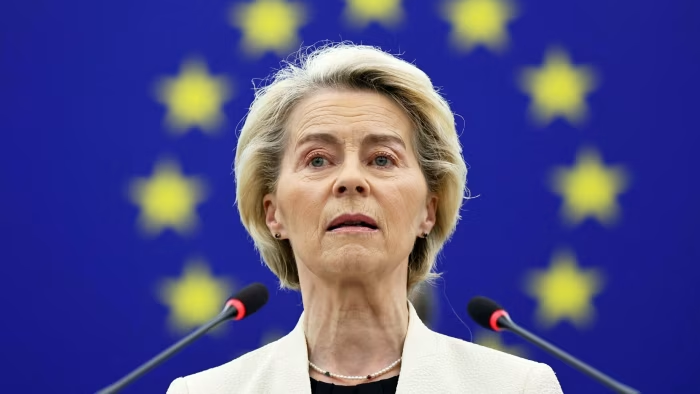Von der Leyen will face a vote of no confidence because of Pfizergate

Ursula von der Leyen will probably survive the vote but it could force her to make compromises with the right and left. Credits: Antonin Utz/AP
Ursula von der Leyen, president of the European Commission, will face a vote of no confidence in the European Parliament in the wake of the scandal known as “Pfizergate.” The initiative was initiated by Romanian MEP Gheorghe Piperea, from the AUR party and a member of the European Conservatives and Reformists (ECR) group. The motion exceeded the required minimum threshold of 72 signatures, gathering 74 from MEPs from various sides: ECR, Patriots for Europe, Europe of Sovereign Nations, some unaffiliated and even a member of the European People's Party (EPP). The vote is expected in the July plenary session, but it is unlikely to succeed, partly because of the complexity of European regulations that guarantee the EU executive a system of imperviousness to parliamentary challenges that is unparalleled in the constitutions of democratic countries.
Specifically, the document was signed by 32 MEPs from the conservative ECR group (in Italy it includes MEPs from Fratelli d'Italia), 23 from the sovereignist ESN group (born on the initiative of the Alternative for Germany party), 4 from Patrioti per l'Europa (in Italy represented by the League), 1 from the EPP (the center-right populars, in Italy represented by Forza Italia) and 14 non-attached. The reason for the tabling of the motion lies in the so-called “Pfizergate,” the scandal that engulfed the chairwoman of the Commission for the management of the vaccination campaign with the multinational pharmaceutical company Pfizer. At the center of the controversy is von der Leyen's confidential handling of negotiations with Pfizer during the pandemic: in 2021, the chairwoman negotiated the purchase of 1.8 billion doses of anti-Covid vaccine (worth 35 billion euros, in a larger 70 billion package) via private messages with CEO Albert Bourla. Of those doses, less than 20 percent were actually used. The Commission has repeatedly refused to publish the text messages, despite press requests. Last May, the EU's Court of Justice upheld an appeal by New York Times journalist Matina Stevis-Gridneff seeking access to text messages exchanged between von der Leyen and Bourla, reversing the Commission's decision to deny access to the text messages.
However, the motion revealed splits even within the ECR group itself, led by Fratelli d'Italia and the Polish Law and Justice (PiS) party. While all 20 PiS MEPs signed, Italian Nicola Procaccini (ECR co-chair) questioned the appropriateness of the motion, noting that it would involve the entire Commission, including commissioners appointed by ECR governments. “Don't you think such a decision should have first been approved by the group?” he wrote in an internal email. The relationship between Meloni and von der Leyen also complicates the group's line: in the years of her government, the Italian premier has in fact worked closely with the Commission chairwoman, and her ally Raffaele Fitto holds a prominent role in Brussels.
The institutional architecture of the European Union makes it extremely complex to challenge the Commission for several converging reasons. First, for the fact that this requires both the affirmative vote of at least two-thirds of the votes cast (excluding abstentions) and an absolute majority of the current 720 MEPs, (thus at least 361 yes votes). While abstentions lower the number of votes cast and thus theoretically reduce the two-thirds threshold, they do not affect the 361 votes needed; on the contrary, they make it more difficult to reach that fixed figure. Requiring such a high quorum ensures that only a solid cross-party and cross-country majority can pull the plug on the EU executive. And it also constitutes a protection in favor of the executive that is unparalleled in the constitutions of democratic countries. Moreover, the procedure imposes a minimum three-day interval between submission and vote, allowing time for groups to regroup and convince the undecided. It is a combination of factors that makes this kind of attempt essentially futile: so far, all motions of no confidence against the Commission have failed to achieve both quorums simultaneously.
https://www.reddit.com/r/europe_sub/comments/1lm37ko/von_der_leyen_will_face_a_vote_of_no_confidence/
This post has been shared on Reddit by @davideownzall through the HivePosh initiative.
Nothing will happen unfortunately